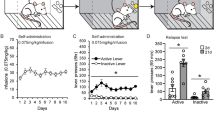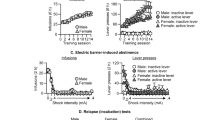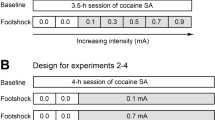Abstract
OPIATE addicts may be treated by the controlled prescription of an opioid drug such as methadone1,2; such ‘replacement’ therapy aims to meet the addict's need for his drug and so to reduce self-administration. Treatment with antagonists is an alternative; this treatment is designed to diminish the efficacy of any self-administered opiate by ‘blockading’ the receptors with substances such as naloxone or naltrexone3. A third method of treatment involves behavioural aversion procedures, which aim to suppress the actions culminating in drug-taking by associating them with unpleasant stimuli, such as electric shocks or apomorphine-induced nausea. It is extremely difficult to assess the efficacy of these methods in human addicts, and laboratory tests in dependent animals offer one means of comparision. We describe here tests of three conceptually different procedures, each reflecting one of the approaches described above. The dependence behaviour was oral self-administration of morphine solutions (morphine HCl 0.5 mg ml−1) by rats which had previously learned to drink such solutions in preference to water4.
This is a preview of subscription content, access via your institution
Access options
Subscribe to this journal
Receive 51 print issues and online access
$199.00 per year
only $3.90 per issue
Buy this article
- Purchase on Springer Link
- Instant access to full article PDF
Prices may be subject to local taxes which are calculated during checkout
Similar content being viewed by others
References
Dole, V. P. & Nyswander, M. E. J. Am. med. Ass. 193, 645–650 (1965).
Martin, W. R. et al. Arch. gen. Psychiat. 28, 286–295 (1973).
Martin, W. R. & Sandqvist, U. L. Archs gen. Psychiat. 30, 31–33 (1974).
Kumar, R., Steinberg, H. & Stolerman, I. P. Nature 218, 564–565 (1968).
Goldberg, S. R., Woods, J. H. & Schuster, C. R. J. Pharmac. exp. Ther. 176, 464–471 (1971).
Davis, W. M. & Smith, S. G. Biol. Psychiat. 9, 181–189 (1974).
Meyer, R. E., Marcus, R., Carnathan, G. & Cochin, J. Psychopharmacology 47, 273–279 (1976).
McMillan, D. E. et al. J. Pharmac. exp. Ther. 196, 269–279 (1976).
Garcia, J. & Koelling, R. A. Psychon. Sci. 4, 123–124 (1966).
Ternes, J. W. Bull. psychon. Soc. 5, 311–312 (1975).
Pilcher, C. W. T. & Stolerman, I. P. Pharmac. Biochem. Behav. 4, 159–163 (1976).
Best, M. R. & Batson, J. D. J. exp. Psychol. 3, 132–143 (1977).
Kumar, R., Mumford, L. & Teixeira, A. R. Br. J. Pharmac. 60, 276P (1977).
Stolerman, I. P. & Kumar, R. Psychopharmacologia 17, 137–150 (1970).
Kumar, R. & Stolerman, I. P. J. comp. physiol. Psychol. 78, 457–465 (1972).
Wikler, A., Pescor, F. T., Miller, D. & Norell, H. Psychopharmacologia 20, 103–117 (1971).
Author information
Authors and Affiliations
Rights and permissions
About this article
Cite this article
MUMFORD, L., TEIXEIRA, A. & KUMAR, R. Resistance of morphine-seeking behaviour in rats to pharmacological and behavioural ‘treatments’. Nature 272, 167–168 (1978). https://doi.org/10.1038/272167a0
Received:
Accepted:
Issue Date:
DOI: https://doi.org/10.1038/272167a0
Comments
By submitting a comment you agree to abide by our Terms and Community Guidelines. If you find something abusive or that does not comply with our terms or guidelines please flag it as inappropriate.



